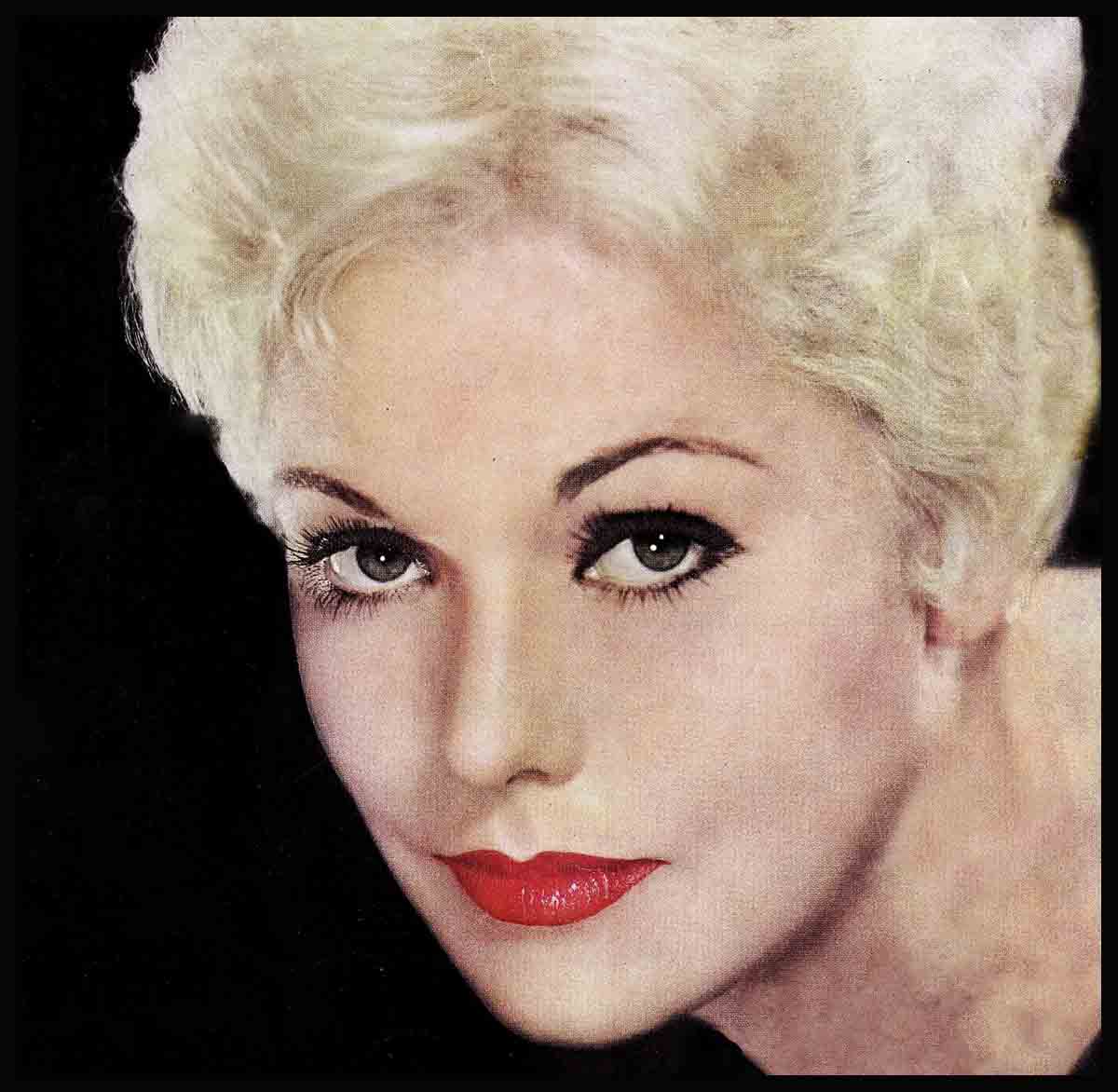
Is Kim Novak Getting Married?
Kim was silent in the plane beside me. Saying nothing and yet saying everything—and I could feel tears that weren’t there. All of Paris, a magic carpet of gaiety and romance, sparkled below us. But not for Kim.
Somewhere down there a train was taking Mario Bandini back to Rome, and Kim and I were on a plane headed for home.
I knew that she was enveloped in a misty world of her own thoughts. Of happiness remembered, and of farewells that had been said. The same quiet reflective world she had shared with Mario before leaving, in the Church Sacré Coeur. . . .
During their last hours together Kim and Mario had gone to Montmartre to see an artist, Gentilini, whose works Kim admires very much. And before going their separate ways, they’d climbed the long, beautiful flight of steps leading up to the magnificent historic white church, the Paris landmark Sacré-Coeur. They went inside to light a candle and to spend a few quiet moments alone together there.
The final hours had gone too fast, but Kim and Mario had managed to spend them away from the press, the photographers, the public who had been so enthusiastically following their every move during our month abroad.
Their last night in Paris was “the most wonderful evening we’ve ever spent together,” Kim had said to me. They had dinner in the royal quarters Kim’s studio had provided for us at the Hotel Bristol on the Rue Saint Honoré. A fabulous place, two floors with many, many rooms, with our own private elevator, with many terraces, and with a sweeping view of Paris below.
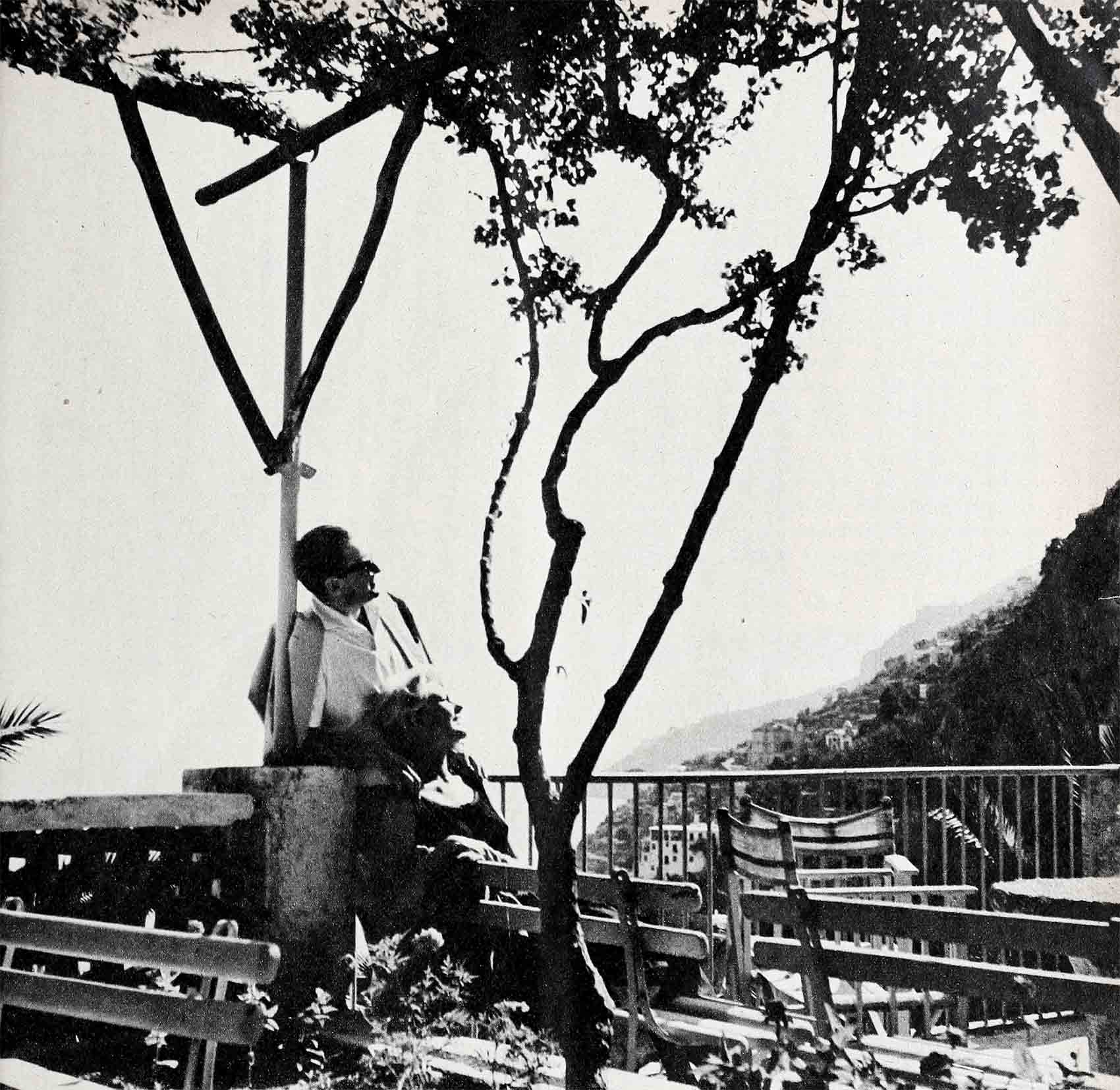
Mario and Kim dined there on a terrace . . . by candlelight . . . and alone. Mario had sent roses. They were on the table. There was music—their own music—from a lovely little music-box Mario had given Kim in Rome . . . a haunting Italian melody playing over and over—and helping to shut out the reminder that they were destined to go in opposite directions.
Mario’s train left an hour ahead of our plane, and Kim had taken him to the train. But their real goodbyes had been said quietly at the Church Sacré-Coeur.
And so our holiday was over—and they were going their separate ways—again. Kim to Hollywood to make a picture, and Mario Bandini to Rome to build a bridge . . .
“Count Bandini?” Mario had said humorously when I’d met him for the first time. “I’m not a Count—I’m an engineer. I build bridges.”
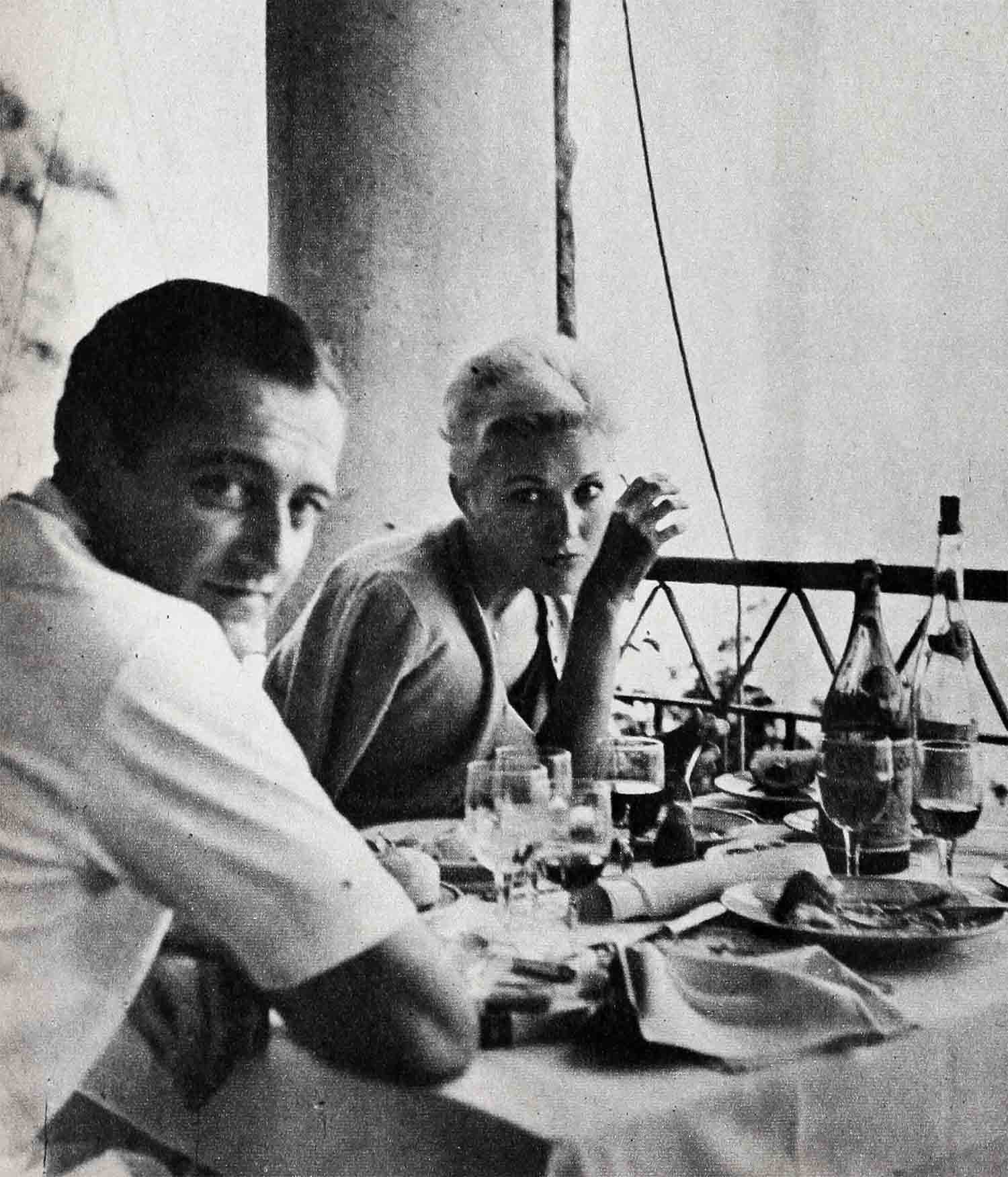
Only the future would know, I thought, whether they would be able to bridge the ocean, the miles, the months, the heritage, that lay between . . .
This was the question I had asked myself over and over during the month we had been abroad. Today Kim was one of the most famous motion-picture stars, but I wasn’t thinking of her career or her professional future. The personal happiness of this lovely, gentle girl means a great deal to me—and has since she was thirteen.
I had viewed Rome, Naples, Paris—wherever we were—with one thought: could a girl so thoroughly American as Kim be happy living there?
And throughout our trip, I’d had the feeling that Mario Bandini, without being at all obvious, was introducing Kim to the life she would share, the homes that would be hers, the people she would know—the whole way of life that would be theirs—if she were ever to marry him.

Likewise, I had felt that Kim, as girls will, was watching with an open eye, envisioning how she would feel if one day she were a part of all this.
Will Kim Novak marry Mario Bandini? This was the question that would be asked over and over in the months to come. Kim’s many friends of the press would be asking, speculating and rumoring.
Behind us—the distance widening between them—was Mario. Ahead was a demanding motion picture career. And ahead, too, was an endearing man who had been part of Kim’s life for so long. Back home—there would be Mac Krim.
Still . . .
Because of my fondness for Mac—and because of a few opinions I’d previously formed—I hadn’t planned on liking Mario Bandini at all. . . .
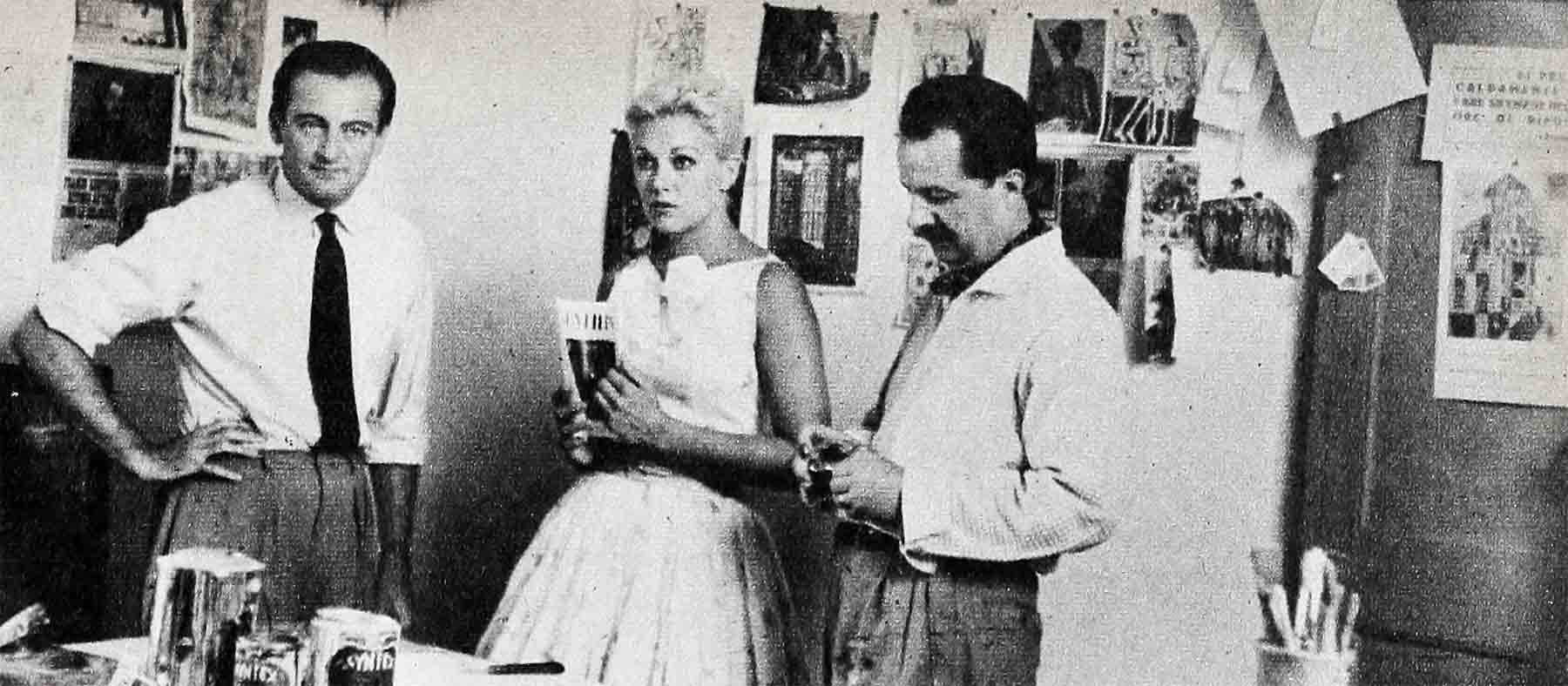
During all the past year, since Kim met him at the Cannes Film Festival, I’d been hearing about Mario Bandini from her. He wrote fairly often, and he’d called her at least once every week. But he was almost fictitious to me—one of those titled playboys who go poloing and yachting around and living off the fat of their fathers’ land. In spite of the little things Kim would tell me, I thought him the summer romance of last year. And I’d given him no serious thought when Kim wanted me to “tour Europe” on a month’s vacation with her when she finished “Pal Joey” at Columbia.
But as we would talk excitedly about our itinerary, the countries we’d visit, what we would do—we seemed to always end up spending much, much time in Rome. Kim kept telling me how much she loved this beautiful city the year before. Helping her make plans—and shopping with her for a red alpaca cardigan sweater to take to Mario Bandini—I began to wonder seriously if the beauty of the city was Kim’s prime interest.

I felt I could be right when our itinerary began to change so rapidly—literally in mid-air! Kim has an ear condition that bothers her when she flies, and landings are painful for her. Kim’s condition seemed to become worse alarmingly as the hours went by, and land neared. Soon Copenhagen was off our schedule, then Switzerland. Finally Kim said she felt so miserable she thought it better to go straight to Rome. “My ears,” she reminded me again.
We landed unannounced at midnight. Kim was positively exuberant. “Last year I got to see just enough of Rome to love it, and I promised myself I would come back and really take time to explore this beautiful city,” she said. But her eagerness as we approached the Grand Hotel seemed to indicate that an additional fascination awaited her.
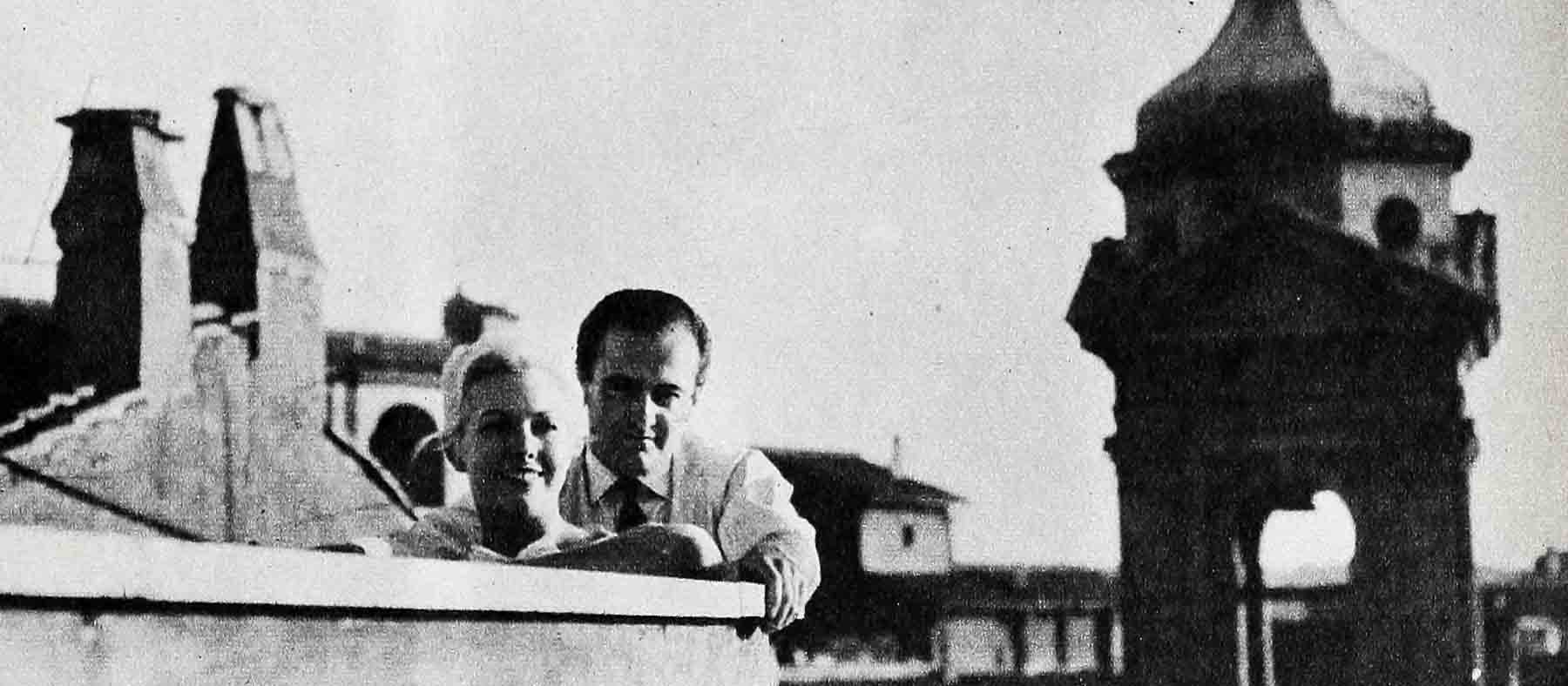
Every room of our suite was filled with beautiful flowers! There was an enormous arrangement of lovely lavender hydrangeas in the living room. Reading the card with the lavender flowers, Kim said breathlessly, “You know—I talk to him every week . . . and now here we are! I can’t realize I’m really here—and he’s sending all these beautiful flowers!” Could I realize that we were really there? No, I could not. . . .
Not the enormity of the reception. Not remembering little Marilyn Novak when I first met her, when she came to the teenage parties I arranged as part of the promotion I did for a Chicago store. Remembering the shy little fawn of a girl who’d stood on the sidelines watching the others so eagerly, so sure she had nothing to offer, so sure no boy would ever look at her.
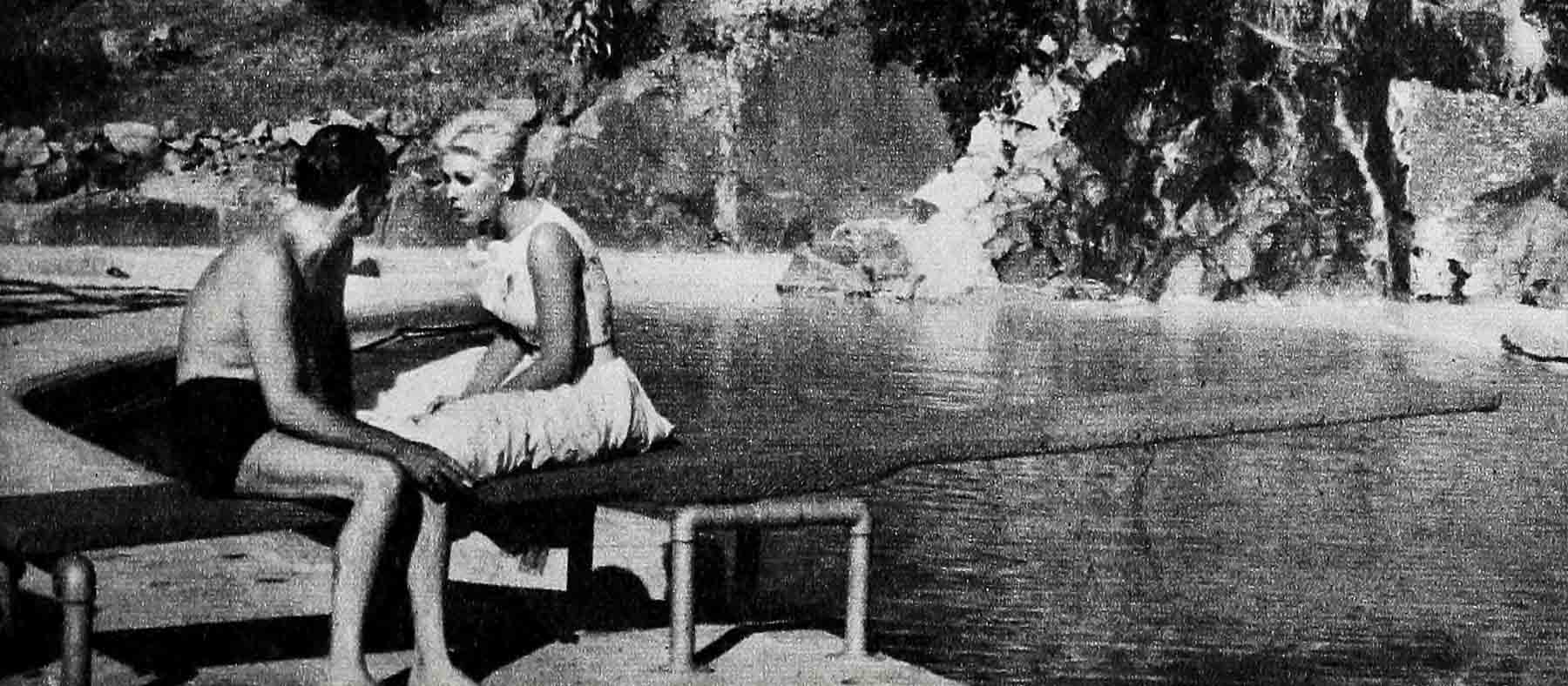
Today, Kim Novak had come a long way from that Chicago department store as a teenage model. Perhaps at the moment, too far. . . . Smothered in a roomful of flowers from this Count—whatever that meant in Italy. Kim was far too down-to-earth for this sort of thing, I thought—before I met Mario Bandini.
He called immediately, and Kim was very nervous seeing him again. “Maybe Mario won’t like me when he sees me this year, Norma. Do you think I’ve changed from a year ago?” she kept saying over and over. She tried on at least half a dozen things before deciding what to wear. Then—typically Kim—she put away all the glamorous clothes she’d brought and put on her beloved casuals—velvet slacks and a black silk shirt.
I was charmed by Mario Bandini immediately. By his warmth and gentleness, his lively magnetic eyes, and his wonderful, contagious smile. All this, and handsome too! Still, I was a little wary. The “Count” somehow removed him from our way of life in America.
Mario, however, soon straightened me out on this. “Norma, I want you to know I’m not a Count, and I don’t want to be a Count. I don’t know how that story ever got started,” he said smilingly.
As an engineer, he builds more than bridges, but they are his love, I was to find. He had so much enthusiasm for his work, and he began to tell us thrilling things that were happening to him in connection with his various enterprises. His construction company, his canning company, and his motion picture productions company—just to mention three!
This wasn’t the man I’d pictured at all. I’d assumed that as a “Count” he never worked. True, he was a wealthy man, but he was also a brilliant business man, a very hardworking man. And this, I was soon to find, was part of his great charm for Kim.
That night when Mario had gone, Kim stood for a long time at our hotel window looking at the beautifully lighted fountains in the square below. “Oh, Norma—I love Rome so much!” she said finally. Rome? Well, I wondered!
My own resistance to Mario Bandini was melting fast, but in spite of liking him, there’s always a question where Kim’s concerned. Is a man interested in Kim the person, or Kim the glamorous motion picture star, and the publicity attached to her?
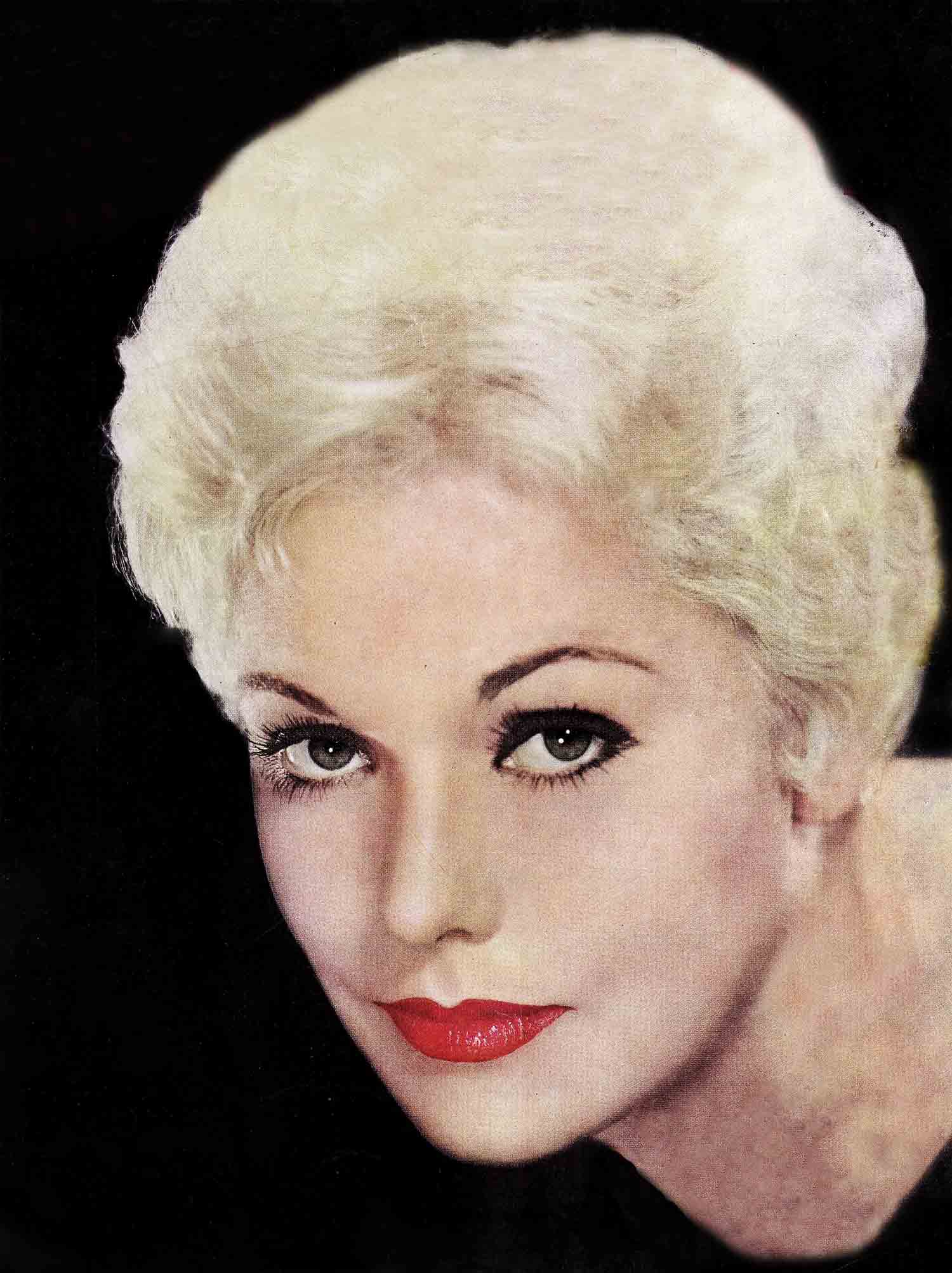
I soon found out. Reporters and photographers had been blocking the corridors of the Grand Hotel. I’ve never seen so many in my life—all of them determined to do or die. Kim graciously agreed to a press conference, but this turned out to be a frightening experience physically. When Kim and Mario left the hotel there was pandemonium, with photographers pushing and yelling, and me being pushed across the street by the crowd in the opposite direction. Mario was blocking and making every effort to protect Kim. They finally made it to his car. He was kind with the press, but he was very firm. He avoided photographers whenever possible during our stay. I sensed Mario Bandini disliked all this intensely, which pleased me very much.
During the weeks that followed, our “extensive tour of Europe” became an extensive tour of Rome, with Mario a most persuasive guide. I had the feeling Mario was acquainting Kim with his homeland, his beloved city, his friends, his whole way of life. And that Kim was perhaps unconsciously weighing things Roman against things American, and wondering if she could be happy so far from home.
We saw the Roman Forum at sunset and it was beautiful. We visited the old Italian Village d’Este, Tivoli with the luxurious splendor of fountains that seem to be springing from everywhere. We went through the old churches and admired the beautiful mosaics, and we visited the Cathedral of St. John, stirred by the thought that it was built 310 years after Christ, the first church in which Christians worshiped in public, and we saw an outdoor concert, and the Coliseum.
Kim was saying how much she adored the whole city, and suddenly Mario said “You know, Kim—I don’t think you belong in America. You’re more European—you fit into a European way of life—”
A new kind of glow seemed to come over Kim whenever she was with Mario Bandini, I was beginning to notice. For the first time since I could remember, Kim seemed to have forgotten her career completely. She hadn’t mentioned the script for her new picture since we’d arrived, which was certainly unusual! And I was just thinking how far removed Kim was from all that, when suddenly we were surrounded by Columbia’s Rome executives, who were having a party there. For a moment the carefree look seemed to leave Kim, but a dance with Mario revived it again.
“All of a sudden this just left me completely. The studio—all of it,” Kim confided to me later. “I’d forgotten all about it. But everything is so wonderful. I haven’t felt so relaxed and happy in ages!”
Then one evening Kim and Mario were going for a drive around Rome in Mario’s little foreign car, when Kim heard American music coming from somewhere. “Oh, let’s listen!” she said suddenly, and Mario stopped the car. Listening to the music made her so homesick, Kim said later, especially hearing it, and not feeling quite part of it. Kim loves Neopolitan music. Everywhere we would go a little group of musicians would gather around her and serenade her, and Kim loved it. But suddenly, hearing American music, she knew how much she had missed it. As Kim described it to me, they sat and listened “and it was so frustrating—because I couldn’t get with it.” It was as though she were trying so hard to grope for something the American music represented, Kim explained, and she couldn’t get it “tuned in” any more. Thinking about it, I wondered what Kim’s reaction meant. Was she thinking of Mac when she heard the music? Was she afraid of her feeling for Mario Bandini, because she could no longer feel fully American?
Kim had wondered what her feeling would be—as well as Mario’s. “You think of these things—that you won’t feel the same, meeting again. But it’s even better. We’re closer than we were a year ago. I love being with Mario—I enjoy being with him. He’s such a fine person, and so much fun. He certainly has everything one could want in a man.”
And as Mario had said, “Last year it was such a gay-holiday kind of relationship. Now we’re having an opportunity to really know one another—”
One evening after we’d gotten back from a lovely day with Dino and Sylvana De Laurentis at their beautiful villa, Kim said glowingly, “You know—now I understand why so many people want to live here.” The De Laurentises (who produced “War And Peace”) are old friends of Mario’s. They had an interesting, stimulating group of people there, and I had the feeling that Kim was looking at their home with an interested eye and wondering if perhaps she might be living in a villa like that too some day.
But then, there was another evening. . . .
We attended a very elegant dinner with a very titled gathering. Every guest was a Countess or Marquis or Princess—something. Dinner was served on the terrace of a mansion overlooking Rome. They were very wealthy people with many, many servants. All the women seemed so very elegant and chic, so different from Kim’s usual casual way of life. And their conversation seemed to be confined to two items, the tremendous balls they attended and the yachting cruises they planned.
Now and then throughout the evening I would catch a serious-faced Kim absorbing the whole scene around her, and the next morning I knew she must have given it much thought.
“I had the strangest dream last night,” she said slowly. “I dreamed I was having a party. One moment it was at my beach house and the next—some place I’d never been before. I’d invited these very nice people we met last night to a wiener roast, and I’d said on the invitation, “Let’s all have a ball!” Well, I was in my shirt and slacks—but they arrived dressed for a formal ball.
“Mario was there,” Kim continued, “and one moment in my dream I looked at him. He seemed to be shocked by all this. And the next moment the two of us and all of them were sitting on the floor, roasting our wieners, and looking into the fire—and Mario was laughing hilariously.”
Perhaps it was my own imagination, but I felt the moonlight go out of Rome for Kim. Until the next day—when Mario and Kim and I were discussing the different ways of life.
Mario talked about his own attitude about living—those things which meant much to him. “I enjoy being alone, too,” he said. Immediately looking at Kim and including her in the aloneness away from others.
“I love to hunt,” Mario said.
“I’ve always wanted to learn to hunt,” Kim said quickly. Mario described the best part of hunting to him was “the thrill of getting up before dawn and sitting very, very still, watching the beauty and grace of the animals, watching the mothers feed their young, and watching the dawn come up.
“I don’t like the killing part of hunting,” he said. He liked all the things that went with it. He mentioned the peace and quiet of the early morning “and the closeness to God.”
Afterwards Kim was saying how much this conversation reflected the kind of person Mario is. That it was really a self-portrait in words of “this wonderful, wonderful, kind, thoughtful person.”
Mario’s also building a hotel, and he recently finished a lovely modern theater building in which all the seats are covered with lavender leather—a tribute to Kim. Kim listens, her eyes sparkling, when Mario talks about the buildings he’s constructing and his many other enterprises. “I admire men with brilliant business careers and with such energy and enthusiasm for work,” she’s said. “I love to hear Mario talk about these things—to see how much they mean to him.”
Part of Mario’s great charm for Kim is this great drive to accomplish “the goals he sets for himself. Mario is very wealthy, and he could live a life of leisure without exerting any effort at all. But if he were living without working, I’m sure we wouldn’t have a thing in common.” With Mario’s drive in his own professions “he understands so completely my feeling toward acting and the movie business.”
I’ve heard some comment that if Kim were really interested in Mario Bandini she shouldn’t continue her career, but I feel exactly the opposite. Mario has tremendous admiration for Kim as an actress and for her determination, the way she’s going about her career. We saw a private screening of “Jeanne Eagels” together, and Mario was completely carried away. “I had no idea! She is such a brilliant actress,” he kept saying.
I’m sure Mario wouldn’t want Kim to give up her career if they should marry. Mario is much more interested in a woman who does interesting things and he knows this is bringing out the best of Kim—that she would be happiest having her career. However, he feels strongly that one’s personal life should not become public.
One night while Kim was getting dressed to go out with him, Mario and I got on the subject of marriage—and why at thirty-seven he had never married. “I go out a lot, but so many women are lazy and do nothing that I cannot admire them completely. At least, not enough to consider them seriously.” Mario said. “I have so much respect for Kim because of her great desire to do well.”
From things he’s said, I’m sure Mario finds Kim a fascinating paradox. “Kim is a very strange, wonderful combination—that is sensational. A beautiful, glamorous creature on one hand—and then on the other hand, the real Kim—so down-to-earth and so gentle and lovable. It is so unusual to find this combination in a woman.”
Mario Bandini has much to offer that would seem to be right for Kim. Sensitivity, strength, understanding, tolerance when it’s needed, and much, much love. He’s calm and easy-going and has the needed maturity. Kim is only twenty-four and all these big things have happened
so fast to her, I feel she needs the strength of someone who will help reassure her through a situation—say—like this.
They have the same faith and this is important to them. Being Catholic and not believing in divorce, I’m certain if they had any serious plans they’d want to be very sure.
Mario plans to come to the States as soon as his business will allow. He’s coming to see Kim of course, and to meet her family. He will have the opportunity, like Kim, of experiencing a different way of life in America as she did in Rome. If Mario Bandini wants Kim’s hand he will be meeting his strongest rival—the land she loves.
There is also the matter of Kim’s contract with Columbia. I wonder of Mario has asked himself, “How could I ask Kim to give up all she’s worked for there?” Recently, however, Kim has been having studio squabbles with Columbia, including suspension for breach of contract. Kim reportedly felt her salary “too low, considering her roles and billing.”
And Kim has said to me, “You know it’s amazing how one can find happiness outside of her work. Perhaps it’s because things now are so exciting and different. And then again, perhaps not . . .”
Just before we left, Kim and Mario went to a Roman fountain and Kim threw a coin in to make sure she would return.
There would be problems ahead a toss of the coin could not decide. Only time would tell.
THE END
It is a quote. PHOTOPLAY MAGAZINE NOVEMBER 1957




